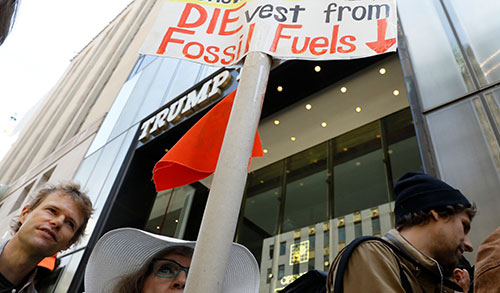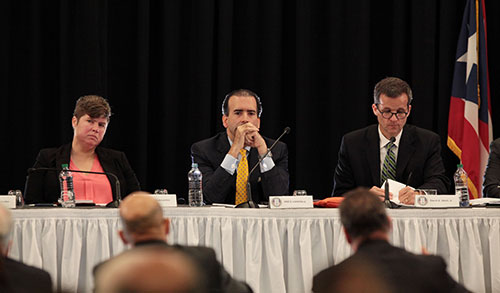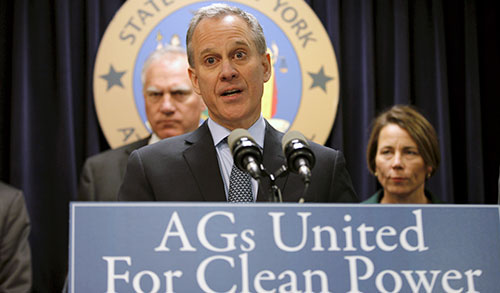Welcome to Our Research Archive
Search and filter by content type, issue area, author, and keyword

June 21, 2017
Other People’s Money: The Immorality Of The Fossil-Fuel Divestment Campaign
California is the center of the political campaign to induce pension funds and others to divest from fossil-fuel investments, justified as a path toward environmental improvement. Unsurprisingly, a new study finds that divestment would lead to losses of up to $3 trillion for Calpers over a 50-year time horizon. The implications for smaller retirement systems also are negative. Since the environmental effects of divestment…

June 21, 2017
Another Deal on Power Debt Won’t Help Puerto Rico’s Economy
It’s been a long and winding road toward the resolution of the Puerto Rico Electric Power Authority bonded debt. It totals $9 billion, the largest single component of Puerto Rico’s overall debt of about $70 billion. The commonwealth’s top officials, the power authority and the bondholders recognize that the power authority cannot service this debt in full while modernizing…

June 15, 2017
NY Attorney General Is the ‘Energizer Bunny’ of Exxon Perfidy
This piece originally appeared as “NY attorney general is the ‘Energizer Bunny’ of Exxon deceit” in The Hill. When last we observed New York Attorney General Eric Schneiderman’s pursuit of ExxonMobil, he was arguing that the firm had misled investors about the risks of anthropogenic climate change. According to Schneiderman, climate change is real (true); its adverse…

June 8, 2017
Carbon Taxes: Et Tu, Alex Brill?
My colleague Alex Brill has continued the widespread practice of economists pretending to be politicians with his short new essay arguing for a “carbon” (greenhouse gas) tax as a “permanent” replacement for existing “carbon-related” regulations. His argument is that such a tax would be “more efficient” than regulatory strategies “developed by bureaucrats in Washington,” and the revenues…

June 6, 2017
Fact-checking Paris: The Washington Post Drives into a Ditch
Now, this is entertainment. “This” is The Washington Post’s Fact Checker “analysis” posted online less than four hours after President Trump ended his speech announcing the US withdrawal from the Paris Agreement on climate change. It appeared in the print edition the next morning, on the front page and above the fold: “Explanation for Paris exit is based on…

June 2, 2017
Leaving Paris: One and a Half Cheers for President Trump
Mr. Trump yesterday announced that he would withdraw the U.S. from the international climate agreement reached in Paris in late 2015, but would seek to renegotiate it so as to achieve a “better deal.” And his disparagement of the “Green Climate Fund” — a planned $100 billion wealth transfer from the developed economies to the developing…

May 30, 2017
ExxonMobil Endorses the Paris Climate Agreement
There is a time to weep and a time to laugh. And the recent letter from ExxonMobil urging President Trump not to exit the Paris climate agreement provides a time for both, with a heavy emphasis on the latter. Let us review the letter in detail, subjecting its assertions to the most basic principles of policy analysis. Related reading: The…

May 25, 2017
Jim Pethokoukis and the Incremental Value of Climate Policy Zero
My colleague Jim Pethokoukis deserves applause for his recent argument that the effects of increasing greenhouse gas (GHG) concentrations are uncertain, notwithstanding the loud assertions of many, and that incremental policy interventions are vastly to be preferred to “abrupt and expensive changes in public policy.” Incrementalism in this context reasonably can be interpreted (or defined) as adaptation over time…

May 25, 2017
The Absurdity That Is the Paris Climate Agreement
Let us put aside initially any dispute about the science and evidence underlying the Paris COP-21 agreement to limit global greenhouse gas (GHG) emissions. Let us ask instead what the agreement ostensibly would achieve and what it would cost. If we apply the EPA climate model under a set of assumptions that strongly exaggerate the effectiveness of international emissions reductions, the…

May 18, 2017
Exxon Lied, People Died — or Something
Thee heat is on, not because summer beckons, but instead because of a pressure campaign now being aimed at the new California Attorney General, Xavier Becerra. An alliance of environmentalists, plaintiff attorneys, public-sector spending interests, public officials, and others is attempting to induce him to investigate the fossil-fuel industry in general and Exxon in particular. The argument is…